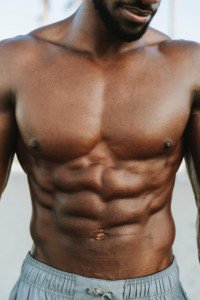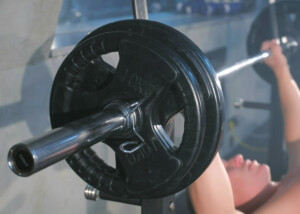A neurologist explains what’s going on when your chest muscle (pecs) keeps twitching.
Does your chest muscle keep twitching?
“For those of you who bench press and are bulking up, the major upper chest muscle that provides the strength for pushing up the weights is the pectoralis major,” says Anthony P. Geraci, MD, associate professor of neurology at Donald & Barbara Zucker School of Medicine in New York.
“It would be very normal to feel a twitch in the chest, and many people feel that the twitch is deep and perhaps even under the pectoralis major,” continues Dr. Geraci.
“Well, there are only two muscles under the pectoralis major: the pectoralis minor and the intercostal muscles, neither of which contribute much to the power needed to bench press.
“The pectoralis minor rotates our upper arm, and the intercostals allow us to expand our chest when we inspire (breathe in).
“If you feel a twitch in your chest but don’t actually see it, that is because muscle twitches can occur anywhere in the muscle, and if they are in the deep part of the pectoralis major you probably won’t see it depending on the bulk of your muscle.
“Not to worry though, it is still just a benign fasciculation (twitch), and you can keep on pushing up that bar!”
What is the biochemical explanation for a twitch in the chest during or following exercise?

When a muscle cell is stimulated by exercise such as a chest press, several key chemical changes occur.
Calcium ions are released from the cell, enabling muscle contraction by facilitating the interaction between protein filaments in the cell.
Muscle cells use adenosine triphosphate (ATP) for energy, which is rapidly replenished through a chemical process.
This process produces lactic acid, which can lower the muscle’s pH and cause temporary fatigue or that all-too familiar “burn.”
One of the outcomes of this chain of events is “injury” to the cell membrane. (But it’s a good kind of injury because it trains the muscle to be stronger for the next chest day.)
This alteration in the muscle fiber’s “chemical soup” leads to random firing of nerves that contract the fiber: the twitching.
Think of this as your body’s built-in massager.
 Dr. Geraci is also the director of neuromuscular medicine at Northwell Health in New York.
Dr. Geraci is also the director of neuromuscular medicine at Northwell Health in New York.
 Lorra Garrick has been covering medical, fitness and cybersecurity topics for many years, having written thousands of articles for print magazines and websites, including as a ghostwriter. She’s also a former ACE-certified personal trainer.
Lorra Garrick has been covering medical, fitness and cybersecurity topics for many years, having written thousands of articles for print magazines and websites, including as a ghostwriter. She’s also a former ACE-certified personal trainer.










































